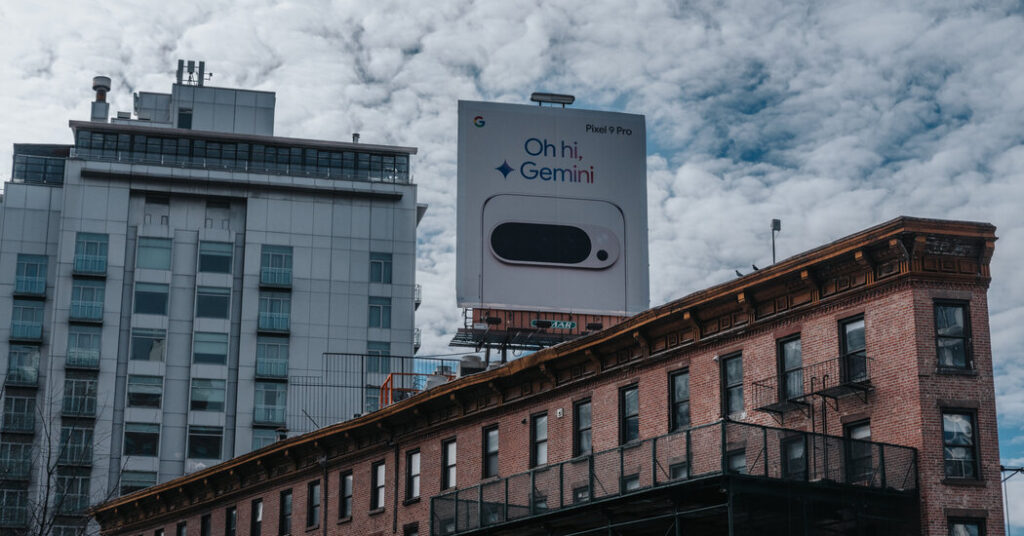Alphabet, Google’s parent company, reported sales that narrowly fell short of Wall Street’s expectations, weighed down by disappointing growth in its cloud-computing division, which sells the company’s artificial intelligence tools to other businesses.
The Silicon Valley giant reported revenue of $96.5 billion in its most recent quarter, an increase of 12 percent from a year earlier, but short of the $96.6 billion that Wall Street analysts had expected. Profit was $26.5 billion, a 28 percent increase that narrowly beat analysts’ estimate of $26 billion.
Google’s cloud division has become an essential component of the company’s move to generative artificial intelligence, the technology that has created a spending boom in Silicon Valley and beyond. Google Cloud’s sales were $11.96 billion in the fourth quarter, an increase of 30 percent from a year earlier, but short of the $12.2 billion that analysts had expected.
The results raised questions about whether A.I. will prove an advantage for Google Cloud, which remains smaller than competing services from Amazon and Microsoft. Alphabet has invested an enormous amount to try to bolster its A.I. offerings, amid investor concerns that American companies may be spending too much on A.I. relative to their Chinese counterparts.
The internet giant announced it would spend $75 billion in capital expenditures in 2025, from $52.5 billion last year, a difference of more than $22 billion that could have otherwise added to the company’s profits.
Alphabet’s stock tumbled about 7 percent in aftermarket trading.
The company’s executives said that the robust spending was essential, on a call with analysts after the results were released. Google Cloud has more demand for A.I. tools than capacity to provide customers with them, said Anat Ashkenazi, Alphabet’s chief financial officer. The company is working hard to bring more capacity online and ease the constraints, she added.
Ms. Ashkenazi also warned that the growth rates for Google’s cloud division might vary in 2025 as the company continues to purchase more equipment and construct more facilities. She added that she expected Alphabet’s capital expenditures to be $16 billion to $18 billion in the first quarter, and that the quarterly figure would change over the course of the year.
The Chinese A.I. start-up DeepSeek caused American markets to quake last week after its chatbot app soared in popularity. DeepSeek has said it trained its system for just $6 million, a fraction of what tech giants like Google spend. Alphabet’s stock took a hit, among many others, though it later recovered. Tech industry insiders have since questioned some of DeepSeek’s claims.
Still, the episode highlighted Alphabet’s crucial need to get A.I. right, in order to keep its digital services relevant to consumers and businesses that have never been more spoiled for choices. And it added heft to questions over whether Google should consider more fully embracing the so-called open source development used by DeepSeek and other A.I. start-ups.
Google “Cloud’s disappointing results suggest that A.I.-powered momentum might be beginning to wane just as Google’s closed-model strategy is called into question by DeepSeek,” Evelyn Mitchell-Wolf, an analyst at the business research firm Emarketer, wrote in a note.
Sundar Pichai, Alphabet’s chief executive, complimented DeepSeek’s accomplishments on the call, but said it was another proof point that A.I. would present enormous business opportunities in the future. He said that Alphabet was investing heavily to service billions of consumers across its products and businesses using its cloud technology.
Google’s search engine, seen as vulnerable to shifting A.I. trends since OpenAI’s ChatGPT took the world by storm in 2022, is so far holding strong. It remains the world’s most popular search product and in the fourth quarter, generated $54 billion in revenue. Analysts had expected $53.4 billion.
As Alphabet continues to invest in A.I., it has also continued efforts to cut other costs, including through work force reductions. Last week, the company said it offered voluntary buyouts to employees in its Platforms and Devices department, which is responsible for its Chrome web browser and Pixel smartphones. The company also cut almost two dozen roles at YouTube this week, according to an email viewed by The New York Times.
Advertising sales at YouTube climbed 14 percent to $10.5 billion, above the $10.2 billion expected by analysts.


